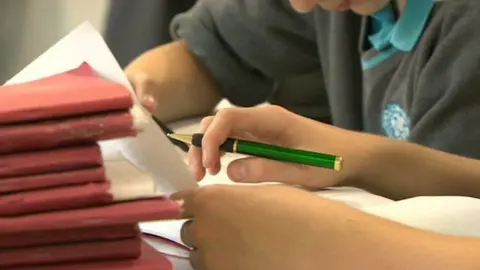Academic selection: Plans for common transfer test agreed
 Getty Images
Getty ImagesProposals for a common transfer test to select pupils for grammar schools have been agreed by the two organisations that run the exams.
Draft proposals have been put forward by negotiators representing the Post-Primary Transfer Consortium (PPTC) and Association of Quality Education (AQE).
A consultation will now take place.
However, BBC News NI understands a common test is unlikely to be in operation for at least two to three years even if there is agreement.
Grammar school principals and boards of governors will be part of the consultation on the new proposals.

There have been two separate tests run by the AQE and the PPTC since the state-run 11 plus exam came to an end in 2008.
Primary school children aged 10 and 11 can choose to sit either test, both tests, or decide not to sit them.
They are used to decide which pupils are admitted to the vast majority of grammar schools.
Both organisations have now put forward proposals for a joint test.
BBC News NI understands that the proposals include:
- Two tests of one hour each taken on successive Saturdays, with one supplementary test for pupils who miss a test due to illness or other circumstances
- That the tests will combine elements of the existing AQE and PPTC tests, with both multiple choice and longer Maths and English questions which require a written answer
- A charge to families of £20 per pupil to enter the tests, although children entitled to free school meals will not have to pay
There are some significant differences between the current AQE and PPTC tests.
Currently 29 schools use the AQE test alone to admit pupils, 27 use the PPTC test alone and 7 use results from both tests.
Parents pay a fee to enter their child for the AQE tests, unless they are eligible for free school meals.
In 2018, that fee is £50, whereas PPTC do not charge a fee for entrance to their test.
'Encouraging progress'
The formats of the current tests also differ.
The PPTC test involves two multiple choice Maths and English papers taken on one day set by GL Assessment, a company specialising in educational tests.
There is also a supplementary PPTC test paper which can be taken on a separate Saturday.

The AQE test involves three papers taken over three Saturdays, which pose a series of English and Maths questions and tasks.
The GL Assessment test is used mainly by Catholic grammars, while the AQE test is used mainly by other grammars.
Every year about 2,000 pupils sit both tests, which can mean they sit five transfer tests on five successive Saturdays.
In a joint statement to BBC News NI, AQE and PPTC said "encouraging progress" had been made.
"Provisional agreements on the financial model which could support an assessment offering access to all grammar schools, the style of test paper and the number of separate tests were presented by the negotiating teams in the last fortnight to the groups' respective AGMs," they said.
"Schools have been asked to reflect upon the direction of travel and to report, where necessary, to their boards of governors."
'Absolutely exhausted'
However, BBC News NI understands that grammar schools will face additional expenditure in the event of a single test.
Additional costs - of around £4,000 in some cases - may be the main difficulty before a common test can be confirmed.
Primary school principals, governors, teachers and parents will also be consulted before any single test comes into effect.
Cathy Humphrey, principal of Groggan Primary School near Randalstown, welcomed the proposal.
"To expect children, age 10 and 11, to sit tests on four Saturdays in the run up to Christmas is just too much," she told BBC Radio Ulster.
"I've two children who came through the system myself and by the time they have done the fourth test, the children are absolutely exhausted."
Cathal O'Doherty, headmaster of Our Lady Queen of Peace Primary School in Belfast, also said that one test was "better than three or four".
However, he added that a lot would depend on what form the new test would take and he warned the changes could cause even more disruption for teachers trying to prepare children for the exams.
The 11-plus examination was abolished in Northern Ireland in 2008 by the education minister at that time, Caitríona Ruane.
Nevertheless, a significant number of children enter the transfer tests each year.
Academic selection remains a contentious issue.
In 2017, a policy group run by the Department of Education (DE) criticised the impact of selection.
